| |
"I did things on that picture that I wouldn't do now. In retrospect, I like that it wasn't at all a "safe film" to do for a first picture, it's very film noir. For me, the film is a lot like a Don Siegel picture. It has a really hard edge and a realistic film noir feel to it." |
| |
Writer/Director Eric Red* |
In the above interview, Red asserts that he was 26 years old directing his first feature. The dates don't quite work unless the movie was significantly delayed before its distribution but hey, kudos to the man for that kind of achievement at such a young age. Orson Welles springs to mind. But then Welles was 25 when he directed Citizen Kane. Alas, Cohen and Tate doesn't quite share the same critical cachet as Welles' masterpiece. But there are elements in Eric Red's directorial debut that are astonishing for a first time director. The opening is a stunning scene, reminiscent of Cronenberg's terrifyingly claustrophobic opening to A History of Violence. It helps, or it used to help, that we know nothing before the scenes are shown, piece-by-piece. The slow burn reveals used to be aided immeasurably by the removal of the explanatory text, which was tacked on the front of the movie at some point in its history. Alas, that absence of text was only on an earlier DVD release. Here, the text is reinstated (an error of judgement methinks). On my DVD, what I originally took as an avant-garde decision to include twenty seconds of suspenseful and silent black spacing before we fade up on an isolated house in the middle of a field, is in fact the space left by the removal of the text. Face, let me introduce you to egg. Once you've sound mixed your movie, it costs a significant amount to go back and reversion, hence (I suspect) why the black spacing was retained. My feeling is that the black still adds to the specific air of menace of the first scene. We have no idea why we are on edge but we are – hence the power of that scene. The text just says, in so many words - 'This is the situation... Be afraid...' so you're already there not led there by superior direction. The text has been included in this edition – I just wish it hadn't been.
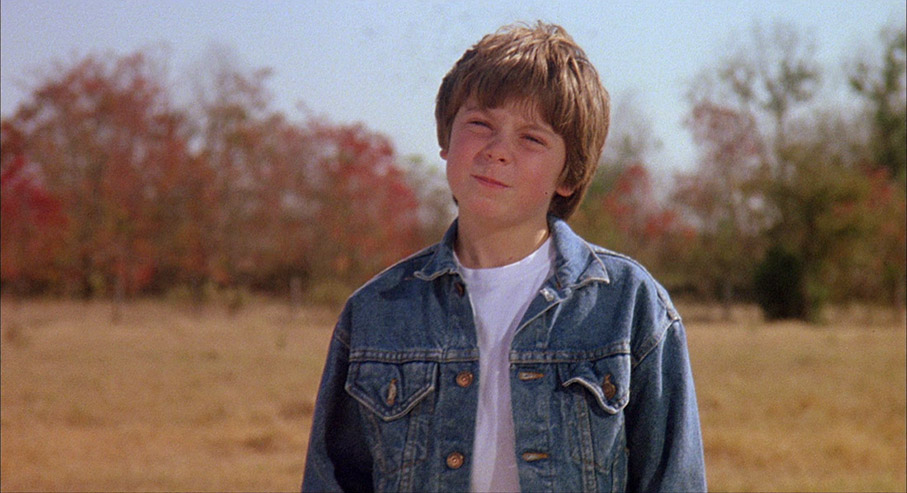
Cohen and Tate is the story of a young boy who has witnessed a mob crime and is being protected (not too well, it seems) at an isolated house by a few FBI agents. There, just did the text's job for you. Alas, I'm unable to review the movie without mentioning the general plot but do all you can to forget my words and close your eyes for 20 seconds after Eric Red's credit to fully get hit by the first scene with the maximum force. The boy's father, not too happy and constantly on edge is radiating concern like a beacon and his wife is just as terrified. The simplicity of the staging somehow adds to the suspense that communicates itself through FBI nonchalance, parental fear, subtle nervous tracking shots, a dog that won't sit still and the eventual arrival of two men with murder on their minds. The bulk of the narrative is the waged war between two mismatched killers with their child captive trying to turn the two men against each other. And boy, is this movie grim. I've not seen a child in such a sustained, dire situation before. Not a moment goes by without some sort of threat to his well-being. It's because of this constant drip feed of "Gonna kill you if you don't shut up..." that the film got harshly treated by the censors of the day and a lot of the Peckinpah overkill got toned down. But there's enough nasty stuff in the film to satisfy any gorehound.
Roy Scheider plays Cohen, the older, colder, detached professional hit man. Never afraid of challenging roles, Scheider throws himself wholeheartedly into the part and is suitably, icily convincing. He manages to elicit some audience sympathy by simply being professional as oppose to the psycho nutball he has as his partner. Adam Baldwin, marketed as known for his grunt's turn in Kubrick's Full Metal Jacket and as the mercenary with the girl's name Jayne in Firefly, plays Tate. If anything gives the director's young age away, it's Baldwin's performance. Now, Adam Baldwin was almost exactly a year younger than his director and as Red says on the commentary, playing psychopaths is a tough gig for an actor. Baldwin wasn't reined in enough for my money for him to be completely convincing. Don't get me wrong, I enjoyed his performance but a little less blatant threat and snarling and more sly cunning would have been preferable. Then again, the script must shoulder some of the characterisation responsibility. Baldwin is definitely a stark contrast to Scheider and that's all that's required for the movie to stay on the rails. Baldwin kept having me imagine what kind of tinted hell defined his childhood. Dressed in the standard Arnie Mark I Terminator gear, Baldwin does have his moments though.
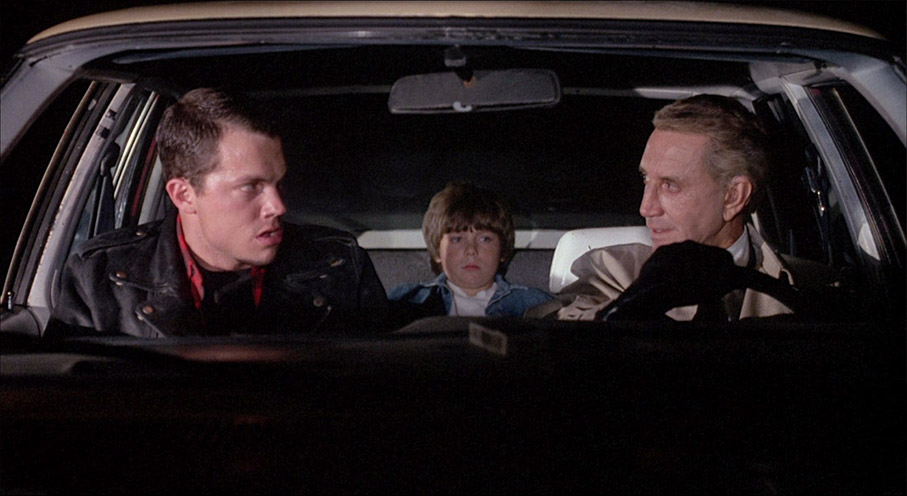
What about the pivotal role of nine-year-old witness Travis played by Harley Cross? For such a young actor, Cross has the biggest (ahem) cross to bear. The film, for good or ill, sits massively on his shoulders and to his immense credit he bears it well. He's authentically scared witless in the back of the car while the hit-men casually promote the idea that they are driving him to his death let alone Tate's almost constant threat to do him right there and then. He is convincingly cunning when he realises that he can push the men's buttons to set them against each other and he handles the role's physicality with gusto. The harder aspects of the role, being able to cry or be upset, he handles well enough not to take you out of the movie. When Scheider shoots someone through the passenger side's open window, take a good look at Cross in the passenger seat. That's not acting. I would not have enjoyed being that close to a gun going off, even a blank firer. It swiftly reminded me of that delightful blooper in North By Northwest just before Cary Grant is shot in the cafeteria. In the background on the right there's an extra, a young boy who puts his hands over his ears because he knows what's coming. The rest of the relatively small cast acquit themselves well. As Travis' fearful father, Cooper Huckabee, a young Harrison Ford-ish lookalike, communicates mostly through nervously handling a cigarette. His folksy all-American charm is sorely tested by the situation the family finds itself in. As his wife, Suzanne Savoy is excellent in a short role, conveying stark terror at what Cohen does and what Tate puts her through. The family scenes are only in the film's first sequence but it's that scene which stands out due to effective and assured direction and utterly convincing performances.
Eric Red is a self-confessed Sam Peckinpah fan and this shows most notably and ironically in the footage that wasn't in the film (but included here as an Extra Feature). The give away of material excised is the FBI agent blasted through a window. We've seen no real bloodletting but somehow the victim is thrown backwards accompanied by what seems to be the remains of a detonated strawberry Slushy machine. The cut shots give that mass of blood some reason to be there. Red uses slow push-ins that are eerily effective at communicating suspense. Bill Conti, probably most famous for his music for Rocky, gives us a threatening underscore with a gentle piano motif with flashes of truly bizarre and rampant orchestration (listen to the main theme under the opening titles and check out the change in mood just before the editor's credit). The film is cut in an efficient, matter of fact fashion by a man who will have his place in cinema history albeit by association. Edward M. Abroms, who also takes part in the Making Of... documentary, started working in television and cut the Joan Crawford episode of Night Gallery entitled Eyes. He also cut a road movie with Goldie Hawn and William Atherton called The Sugarland Express of which noted critic Pauline Kael said "...is one of the most phenomenal debut films in the history of movies." What links these two on Abroms' CV? They were the television debut and movie debut of a certain Steven Spielberg. Nice one, Edward.
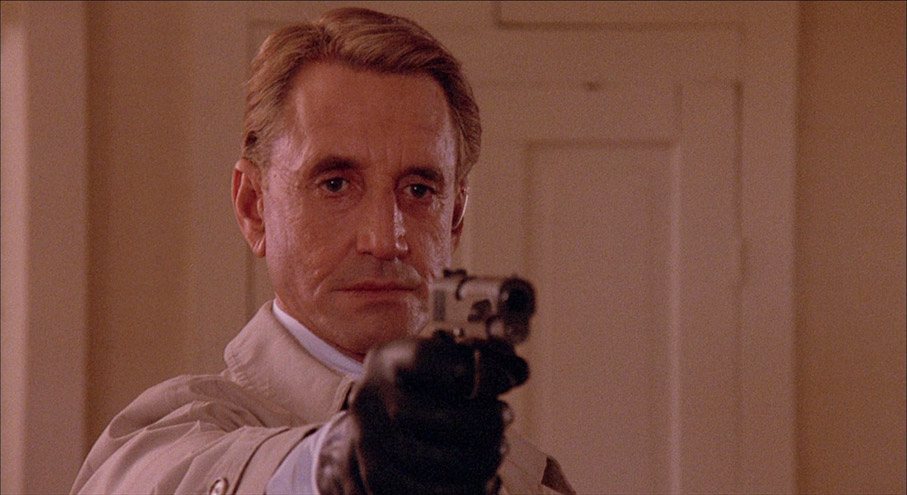
Cohen and Tate is a solid thriller with a great performance from Scheider at its core. It boasts some very effective set pieces and rips through its short running time with no mid-movie sags to worry about. If hit men are your thing, then this is the disk for you.
Presented faintly letterboxed (a total of 5 lines of resolution apiece of the 1090) in the 1.78:1 aspect ratio, Cohen and Tate looks great during its daylight first scene, if a little on the grainy side. I'll just reiterate that lovely feeling of seeing a film in HD after memories of VHS or DVD. Roy Scheider's lined face looks extra detailed here. Most of the movie is set at night on the road but the colours are strong and consistent and the blacks fairly solid. The contrast range is pleasing throughout.
The original stereo audio is perfectly good with all dialogue crystal clear and enough clout for the gunshots and explosions. Harley Cross's Texas accent is quite pronounced but you miss nothing. And, as ever, there are optional English subtitles for the deaf and hard of hearing.
Audio commentary by writer/director Eric Red
Eric Red's commentary is fun, somewhat sparse but packed full of behind the scenes snippets. At the start, I thought he was instantly taking the piss as he said he was then "what they call a 'first time director'", Uh, OK. As if that's some arcane term in the film business. But he soon settles down into a good rhythm. He notes that directors are often taught never to work with dogs or children and how vital and integral both were in that opening scene. He mentions 'this DVD' which kind of gives away the commentary was ported over from the Shout!Factory version. Which is fine. Working with Scheider, he says was "...to date the biggest thrill of my professional career." He reminds us that he was 26 when he made the film (IMDb says Red was born on 16th February 1961. The movie's earliest release was at the Spanish Stiges Film Festival on 12th October 1988. In order for Red to have been 26 (for just one day), they would have had to have started shooting on the 15th February 1988. I can't imagine the movie took much more than six to eight weeks. It must have sat on a shelf for quite a few months before it finally got its domestic release in January 1989. Red announces that the studio released the film with no marketing so it had no success in the cinemas but has since picked up a cult following and a reappraisal. He ends on a nice Roy Scheider story, one that would make any director's heart soar.
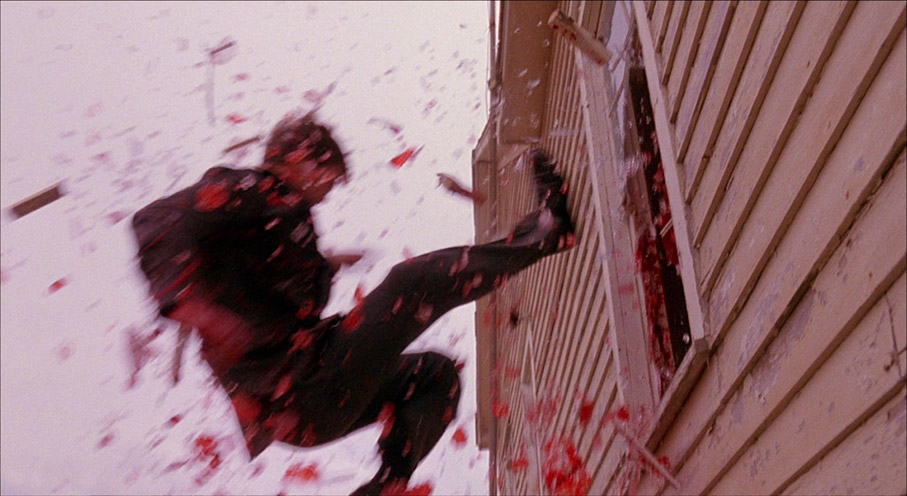
A Look Back at Cohen & Tate, a retrospective documentary featuring Eric Red, cinematographer Victor J. Kemper, editor Edward Abroms, and co-stars Kenneth McCabe and Harley Cross (20' 42')
Odd that these docs have no titles on screen but end credits. This is a good addition and for some reason it's really nice to see Harley all grown up. All interview subjects are interesting and it's jump cut mid-interview so all the audio makes sense but the jumps are a little jarring accompanied by the obligatory swishing sound effect. It's also quite odd to include gas station attendant Kenneth McCabe who analyses his one short scene with Scheider as if it was a significant thespian event of great moment. Eric must have re-watched his movie on VHS because he actually says about the pre-addressed envelope Scheider puts money into, "You don't see who it's addressed to." Uh, Pamela Cohen. We're in HD land now. Adam Baldwin's performance is singled out for some criticism (it's that one note anger/violence over the top aspect, fair enough but I think that's a director thing and not necessarily one hundred per cent the actor's responsibility). Over the end credits, Eric makes a very good point that one's first film is often the most creative because of ignorance. Orson Welles said the same thing, likening the experience to a man walking along a cliff edge unaware of what would happen if he took a misstep. Finally, many decades ago, there was a letter in the now defunct Films Illustrated magazine revealing some of the oddest named actors in the business. Fairly sure Slarek will remember some of the juicier ones (Spo De O'Dee anyone?). Well, we have a winner in the 'Thanks' section of the end credits. He or she may not be an actor but with a name like this, how can they be anything but in show business... Ready? Hint Mint.**
Eric Red's original storyboards for the opening farmhouse shoot-out
Eric Red’s own storyboards for the opening scene, available at the root level of the Blu-ray disc itself as a PDF, are rudimentary but are clearly replicated with some fidelity in the actual shots filmed. The only discrepancy I can see is the direction of travel to reveal the dead FBI agent by the hay bale. In the storyboards it’s right to left, and in the movie, left to right. I mean, we are talking basic line drawings here and not detailed Ridley Scott 'Ridleygrams' but they are more than enough to communicate directorial intent. It's a nice extra and one which shows how much planning is involved before shooting a frame of film.
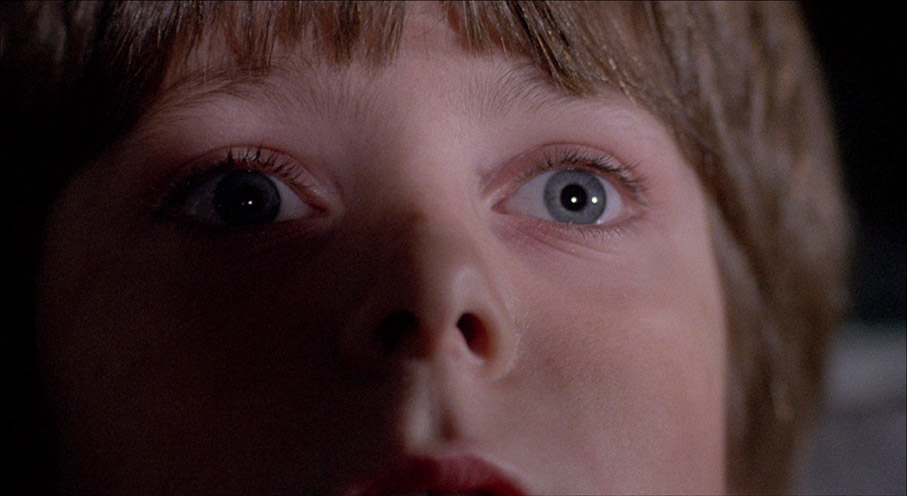
Original, uncut versions of the farmhouse (2' 48") & oilfield shoot-outs (2' 10")
Squibs are us. These are the bloody bits in which Eric is channeling his inner Sam. I'm not sure the demise of the FBI guy feels necessary or not. I'm so used to the film the way it was, its addition seems almost perfunctory. But it sets Tate up as a psychopathic sadist, so that's nice. However, it's a very different story with the oil field shoot out. There is a bit of business which I really responded to (not the bullet hits that needed to be in slow motion if Peckinpah was to be hommaged) but the small moment of Tate trying to pump another round into his gun but he can't because he and his gun is slick with blood. Nice, no sarcasm.
Original theatrical trailer (2' 26")
Wow, a full fifteen seconds of the Nelson logo. Wouldn't get away with that today. The over earnest voiceover artist delivers the requisite trailer hyperbole. Quite a few of the key moments are given away in the trailer but then you have to have seen the film to appreciate that. It's perfectly OK as a selling tool and absolutely typical of its era.
Extensive stills gallery
Forty-two stills, some posed, some behind the scenes, black and white and colour. Fairly standard stuff.
Reversible sleeve featuring original and newly commissioned artwork by Graham Humphreys
First Pressing Only: Collector's booklet featuring new writing on the film by critic Kim Newman
Can't comment on either of these as the preview disc arrived naked and alone but Newman is always worth a read. That man has epic film smarts. Yes, Kim is a man with a fine facial hair assortment.
A good all round package for fans and enough of a picture upgrade and some different extras to be of value to those of us with the DVD. Cohen and Tate is a bloody and grim tale of child abduction and sustained suspense with a cracking turn from Scheider. Recommended.
* http://www.joblo.com/arrow/interview34.htm
** Damn, it's a bloody sweet shop in L.A.
|